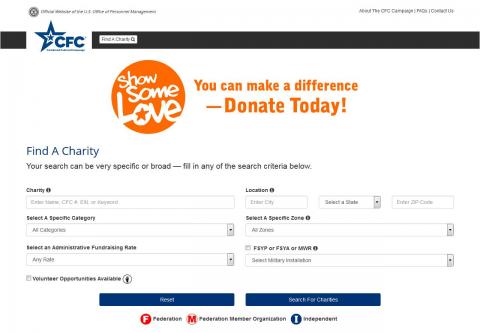
The Combined Federal Campaign underwent major changes last year designed to streamline the government’s charity drive and make giving easier and more efficient. As with any major change, implementation wasn’t smooth, which hurt many charities. Overall giving declined sharply, which has made this year’s campaign even more important for charities.
Fortunately, most of the kinks seemed to have been worked out and this year’s campaign started on time. Plus, its new centerpiece – a new online giving portal – is working much better than it did last year.
For government and military employees, the new online giving portal will be the most noticeable change. To donate, you can go to the new portal at any time: CFCgiving.opm.gov. You don’t need to wait to receive your paper pledge card.
However, you can still use a paper pledge card, which you can download online. Here is the pledge card for federal and military retirees.
The new portal allows you to search for charities to support. If you know which charity you want to support, you can input its name or its 5-digit CFC number. If you don’t know, you can search for charities in several ways. None are perfect. It’s not Google. But you can learn about a lot of charities, all of which continue to meet the CFC’s standards, such as an annual audit.
- You can use key words, such as “Alzheimer’s Disease” or “Breast Cancer,” though you’ll get a very long list of charities. A search on breast cancer, for example, comes up with 126 charities.
- You can search for local charities, which is best done by entering a city’s name. You’ll get a mix of local charities and national charities whose offices are in that city.
- You can also find local charities by searching a particular CFC “Zone.” The DC area is the “National Capital Area/Northern Virginia CFC Zone.” But a search on this zone turns up 1102 charities, organized according to their CFC “federation” (such as United Way).
- You can search for charities on a particular military base. But for most bases, the only charity that comes up is the local affiliate of Fisher House.
- You can search for charities with a certain overhead (“Administrative Fundraising Rate”). Unless you want to support a mainly volunteer-run charity, many charity experts caution about only supporting charities with very low overhead, with the Better Business Bureau saying that a reasonable administrative cost is under 33%. It costs money to raise money and to oversee a charity that is trying to impact a large problem, such as heart disease or poverty in developing nations.
- You can search for charities by 26 “categories.” But the categories are either very broad, such as “Medical Research” (786 charities come up), or somewhat obscure (“Public and Societal Benefit”).
- You can combine search criteria, such as choosing the "Health Care" category and a particular CFC zone. If you choose National Capital Area/Northern VA CFC Zone, for example, you'll get a list of 166 charities organized according to their CFC federations.
- However, it is hard to do a more specific search. If you're looking for "Alzheimers Disease" charities in the National Capital Area, you get no results even though there are several charities in this area that work on Alzheimers Disease. But if you just search on "Alzheimer's" in the National Capital Area, you'll get two charities. However, if you search on "Alzheimers," without the apostrophe, no charities come up. The search engine takes some experimentation.
- You can also search for charities by using the official “Charity Listing,” which is the complete list of eligible charities, organized by their CFC “federation.” Many federations are very specific about their types of charities, such as “Christian Service Charities” or “Community Health Charities,” so that can help you find the types of charities you’d like to support. Here is a link to the DC-area catalog. It will have all the national and international CFC charities, plus local DC charities. Each CFC region has its own Charity Listing. You can find their websites here.
When you find a charity online, you’ll get the same information you’d find in the CFC’s printed Charity Lists -- a short description of what it does, plus its address, phone number, web address and overhead percentage.
A way to get much more information about some CFC charities is to go to CharityChoices.com. You can find charities by the area they serve (“Northern VA” or “International”) or what they do (“Medical Research,” “Environmental Protection,” “Military/Veterans”). Each charity answers seven questions about its work, such as “Why should I support your charity’s work?” and “How can I be sure you will use my money wisely?” You’ll also find much more information about the CFC and its recent changes.
Whichever charities you end up supporting, please give as much as you can. Charities really need your support this year.
